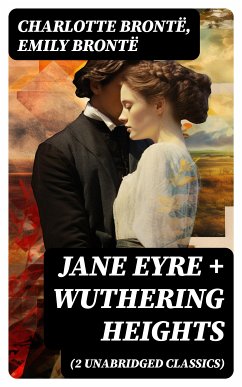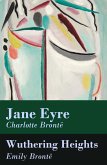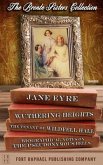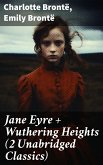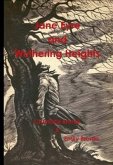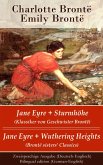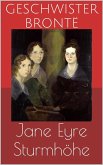This meticulously compiled volume, *Jane Eyre + Wuthering Heights (2 Unabridged Classics),* presents two quintessential works of 19th-century British literature, epitomizing the emotional depth and social critique distinctive of the Brontë sisters' literary heritage. The anthology navigates the complex intersections of personal agency, societal constraints, and the enduring human yearning for love and belonging, rendered in strikingly varied literary styles-from Charlotte Brontë's intricate psychological realism in *Jane Eyre* to Emily Brontë's hauntingly gothic atmospheres in *Wuthering Heights.* This collection is significant for its diverse narrative approaches and the way it encapsulates the tumultuous spirit of the Victorian era. Contributing to this anthology are Charlotte and Emily Brontë, two of the most perspicacious voices of their time, who pushed the boundaries of conventional storytelling. Writing in a period rife with social stratification and gender inequality, the Brontë sisters imbue their narratives with acute awareness of these issues, aligned with the broader Romantic and proto-feminist movements. Each work in this anthology is a testament to the authors' unique ability to convey profound emotional truths and to elucidate the stark realities of the human condition. Readers are encouraged to immerse themselves in this anthology's rich tapestry of themes and styles, offering an unparalleled journey through the moral landscapes and emotional depths of the Brontës' imaginative worlds. This collection is not just a confluence of powerful narratives but a vibrant dialogue between contrasting yet complementary visions, making it indispensable for those seeking a comprehensive understanding of the literary and cultural paradigms of the 19th century. The anthology serves as both an educational experience and a deep well of introspection, inviting engagement with timeless questions of identity, love, and resilience.
Dieser Download kann aus rechtlichen Gründen nur mit Rechnungsadresse in A, B, BG, CY, CZ, D, DK, EW, E, FIN, F, GR, H, IRL, I, LT, L, LR, M, NL, PL, P, R, S, SLO, SK ausgeliefert werden.

